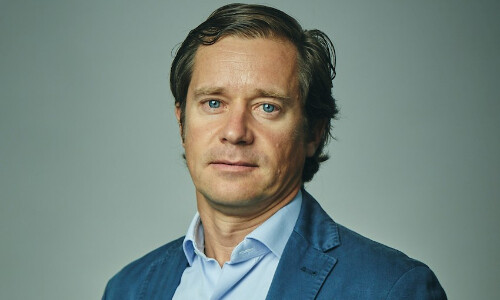Luis Maldonado: «It’s Time For Regulation to Catch Up»

The winds of regulation moving around digital assets are strong and in the last few years, more and more countries have chosen to issue regulation. Yet, still, the debate is far from closed, Luis Maldonado writes in his opinion piece for finews.first.
finews.first is a forum for authors to comment on economic and financial topics.
Digital assets markets – which include cryptocurrencies, stablecoins, and other assets – have undergone a rapid expansion in the post-2020 landscape, marking a valuation trajectory from under $17 billion in 2017 to an astonishing $3 trillion by 2021.
This spectacular growth, however, was followed by a sharp decline of more than $1 trillion by the middle of 2022, a phenomenon known as crypto winter, and from which markets have only partially recovered their value.
In terms of the adoption of digital assets, the user and investor base has expanded significantly from only 0.5 percent of the global population back in 2017 to 3.4 percent by 2022, and, according to some market estimates, it is projected to incorporate more than 300 million new users in the next two years to reach over 4 percent of the global population by 2025.
«There is definitely a growing consensus to regulate the digital assets ecosystem»
The number and variety of digital assets have also multiplied in less than a decade. There were no more than one hundred in 2013 and the number now exceeds 16,000. Furthermore, despite the high attrition rate of these assets, new ones continue to enter the market, with around ten new assets each day according to the European Central Bank.
Against this backdrop, there is growing consensus about the need to regulate the digital assets ecosystem. While necessary, such regulation is also challenging, due to the use of decentralized technologies.
Additionally, the use of open-source platforms, combined with the borderless nature of their application and the fast and constantly evolving landscape, further compounds the complexity of regulatory efforts. One of the first challenges that any global approach to regulating digital assets faces is the lack of homogeneous definitions and classifications.
«Another challenge stems from the borderless nature of digital assets»
A second challenge to regulation is the absence of complete and coherent data. As the International Monetary Fund has raised on several occasions, the lack of homogeneous data disclosure standards by the different digital asset exchange platforms makes it extremely difficult to analyze aggregate data, which could give a comprehensive perspective and guide the direction of regulation.
A related challenge to the lack of comprehensive data is the difficulty of analyzing the systemic impact of digital assets and the contagion across different asset classes. Early analyses point out that the increase in digital assets adoption, especially since 2020, and the growing participation of institutional investors has led to instances of consistent positive correlations with stock indexes.
A fourth challenge stems from the borderless nature of digital assets, which allows for regulatory arbitrage and significantly reduces the individual oversight capacity of countries, thus making the case for a global regulatory approach.
«The approaches taken to reach these regulatory objectives differ across jurisdictions»
However, the fact that monitoring, supervision, and enforcement are mostly fragmented across jurisdictions means that a coordinated global approach is particularly complex. When embarking on the regulation of digital assets, national authorities aim to achieve key regulatory objectives such as maintaining financial stability, ensuring investors protection – especially retail investors – and preventing money laundering and financial crime.
Despite these commonalities, the approaches taken to reach these regulatory objectives differ across jurisdictions. In some cases, regulators and policymakers have opted for principle-based regulation, concentrating on the results, and expected outcomes, rather than prescribing detailed rules.
Another followed by many regulators is the risk-based approach, which establishes a level of intervention following the level of risk. In other cases, when the regulator would like to encourage innovation, an agile approach is the most appropriate, and this often includes the issuance of guidelines, the acceptance of no-objection letters, or the establishment of regulatory sandboxes.
«Regulations about decentralized finance are still in the consultation phases»
Various jurisdictions typically regulate the following: the establishment of licensing and registration regimes for exchanges, custodians and other intermediaries; the extension of AML/CFT requirements for crypto activities; the development of regulation or guidance for marketing and promotion of digital assets; the issuance of regulation for stablecoins; the inclusion of particular provisions to ensure consumer and investor protection; and clarifications to the tax treatment of digital assets.
Generally, regulations about decentralized finance (DeFi) are still in the consultation phases and have not yet been regulated.
International financial institutions such as the IMF have clearly justified the need for a global and coordinated approach to the regulation of digital assets. The growing size and adoption of digital assets, coupled with their increased interconnection with traditional financial systems, has pushed global regulatory standard-setters to expedite the release of guidelines and recommendations.
«Regulators and policymakers need to keep moving forward in this regard»
The winds of regulation moving around digital assets are strong and in the last few years, more and more countries have chosen to issue regulation. Yet, still, the debate is far from closed. Regulators and policymakers need to keep moving forward in this regard, and quickly, because the technology continues to evolve and the use cases to multiply. It’s time for regulation to catch up.
Luis Maldonado is a Professor of Economics and Finance at IE University in Madrid and academic Director of the Impact Xcelerator Financial Systems Lab.
Previous contributions: Rudi Bogni, Peter Kurer, Rolf Banz, Dieter Ruloff, Werner Vogt, Walter Wittmann, Alfred Mettler, Robert Holzach, Craig Murray, David Zollinger, Arthur Bolliger, Beat Kappeler, Chris Rowe, Stefan Gerlach, Marc Lussy, Nuno Fernandes, Richard Egger, Maurice Pedergnana, Marco Bargel, Steve Hanke, Urs Schoettli, Ursula Finsterwald, Stefan Kreuzkamp, Oliver Bussmann, Michael Benz, Albert Steck, Martin Dahinden, Thomas Fedier, Alfred Mettler, Brigitte Strebel, Mirjam Staub-Bisang, Nicolas Roth, Thorsten Polleit, Kim Iskyan, Stephen Dover, Denise Kenyon-Rouvinez, Christian Dreyer, Kinan Khadam-Al-Jame, Robert Hemmi, Anton Affentranger, Yves Mirabaud, Katharina Bart, Frédéric Papp, Hans-Martin Kraus, Gerard Guerdat, Mario Bassi, Stephen Thariyan, Dan Steinbock, Rino Borini, Bert Flossbach, Michael Hasenstab, Guido Schilling, Werner E. Rutsch, Dorte Bech Vizard, Katharina Bart, Maya Bhandari, Jean Tirole, Hans Jakob Roth, Marco Martinelli, Thomas Sutter, Tom King, Werner Peyer, Thomas Kupfer, Peter Kurer, Arturo Bris, Frederic Papp, James Syme, Dennis Larsen, Bernd Kramer, Armin Jans, Nicolas Roth, Hans Ulrich Jost, Patrick Hunger, Fabrizio Quirighetti, Claire Shaw, Peter Fanconi, Alex Wolf, Dan Steinbock, Patrick Scheurle, Sandro Occhilupo, Will Ballard, Nicholas Yeo, Claude-Alain Margelisch, Jean-François Hirschel, Jens Pongratz, Samuel Gerber, Philipp Weckherlin, Anne Richards, Antoni Trenchev, Benoit Barbereau, Pascal R. Bersier, Shaul Lifshitz, Klaus Breiner, Ana Botín, Martin Gilbert, Jesper Koll, Ingo Rauser, Carlo Capaul, Markus Winkler, Thomas Steinemann, Christina Boeck, Guillaume Compeyron, Miro Zivkovic, Alexander F. Wagner, Eric Heymann, Christoph Sax, Felix Brem, Jochen Moebert, Jacques-Aurélien Marcireau, Ursula Finsterwald, Michel Longhini, Stefan Blum, Zsolt Kohalmi, Nicolas Ramelet, Søren Bjønness, Gilles Prince, Salman Ahmed, Peter van der Welle, Ken Orchard, Christian Gast, Jeffrey Bohn, Juergen Braunstein, Jeff Voegeli, Fiona Frick, Stefan Schneider, Matthias Hunn, Andreas Vetsch, Fabiana Fedeli, Kim Fournais, Carole Millet, Swetha Ramachandran, Thomas Stucki, Neil Shearing, Tom Naratil, Oliver Berger, Robert Sharps, Tobias Mueller, Florian Wicki, Jean Keller, Niels Lan Doky, Johnny El Hachem, Judith Basad, Katharina Bart, Thorsten Polleit, Peter Schmid, Karam Hinduja, Zsolt Kohalmi, Raphaël Surber, Santosh Brivio, Mark Urquhart, Olivier Kessler, Bruno Capone, Peter Hody, Michael Bornhaeusser, Agnieszka Walorska, Thomas Mueller, Ebrahim Attarzadeh, Marcel Hostettler, Hui Zhang, Michael Bornhaeusser, Reto Jauch, Angela Agostini, Guy de Blonay, Tatjana Greil Castro, Jean-Baptiste Berthon, Marc Saint John Webb, Dietrich Goenemeyer, Mobeen Tahir, Didier Saint-Georges, Serge Tabachnik, Vega Ibanez, David Folkerts-Landau, Andreas Ita, Michael Welti, Mihkel Vitsur, Fabrizio Pagani, Roman Balzan, Todd Saligman, Christian Kaelin, Stuart Dunbar, Carina Schaurte, Birte Orth-Freese, Gun Woo, Lamara von Albertini, Ramon Vogt, Andrea Hoffmann, Niccolò Garzelli, Darren Williams, Benjamin Böhner, Mike Judith, Jared Cook, Henk Grootveld, Roman Gaus, Nicolas Faller, Anna Stünzi, Thomas Höhne-Sparborth, Fabrizio Pagani, Guy de Blonay, Jan Boudewijns, Sean Hagerty, Alina Donets, Sébastien Galy, Roman von Ah, Fernando Fernández, Georg von Wyss, Stefan Bannwart, Andreas Britt, Frédéric Leroux, Nick Platjouw, Rolando Grandi, Philipp Kaupke, Gérard Piasko, Brad Slingerlend, Dieter Wermuth, Grégoire Bordier, Thomas Signer, Gianluca Gerosa, Christine Houston, Manuel Romera Robles, Fabian Käslin, Claudia Kraaz, Marco Huwiler, Lukas Zihlmann, Nadège Lesueur-Pène, Sherif Mamdouh, Harald Preissler, Taimur Hyat, Philipp Cottier, Andreas Herrmann, Camille Vial, Marcus Hüttinger, Ralph Ebert, Serge Beck, Alannah Beer, Stéphane Monier, Ashley Simmons, Lars Jaeger, Shanna Strauss-Frank, Bertrand Binggeli, Marionna Wegenstein, George Muzinich, Jian Shi Cortesi, Razan Nasser, Nicolas Forest, Joerg Ruetschi, Reto Jauch, Bernardo Brunschwiler, Charles-Henry Monchau, Philip Adler, Ha Duong, Teodoro Cocca, Beat Wittmann, Jan Brzezek, Florin Baeriswyl, Nicolas Mousset, Beat Weiss, Pascal Mischler, Andrew Isbester, Konrad Hummler, Jan Beckers, Martin Velten, Katharine Neiss, Claude Baumann, Daniel Roarty, Kubilay Yalcin, Robert Almeida, Karin M. Klossek, Marc Taverner, Charlie T. Munger, Daniel Kobler, Patrick Stauber, Colin Vidal, Anna Rosenber, Judith Wallenstein, Adriano Lucatelli, Daniel Goleman, Val Olson, Brice Prunas, Francesco Magistra, Brigitte Kaps, and Frances Weir.
Source link
#Luis #Maldonado #Time #Regulation #Catch





